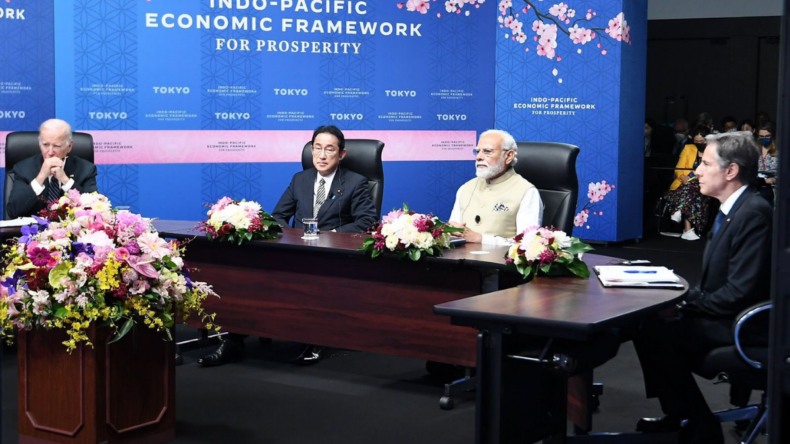
India is part of a group, that consists of 12 countries, which aim to promote economic ties.
India and 12 countries led by the United States launched the Indo-Pacific Economic Framework (IPEF) on Monday. It was to provide an economic alternative to China’s strategic footprint in the Indo-Pacific region.
The IPEF aims to enhance economic partnership among participating countries. It is also to strengthen resilience, sustainability, inclusiveness, economic growth, fairness, and competitiveness in the Indo-Pacific region.
At the IPEF’s launch in Tokyo, PM Modi sat beside the US President Biden and Japanese PM Fumio Kishida. US Secretary of State Antony Blinken was also present. It demonstrated New Delhi’s commitment to work with each other to counter Beijing’s growing assertiveness in the region and beyond.
This economic endeavor was announced a day before the Quad Leaders’ Summit in Tokyo. The second in-person meeting since the September summit in Washington, DC.
Important Initiative for India: PM Modi
PM Modi highlighted the launching of IPEF as a pledge of a common ambition to make the Indo-Pacific region a global economic growth engine in his remarks at the inaugural ceremony. He thanked Biden for the “important initiative” and stated that common and creative solutions to the region’s economic issues.
“India will work with all of you for establishing an IPEF which is both inclusive and flexible, I believe the framework will help strengthen these three pillars and this will put the Indo-Pacific region on the path to progress, peace and prosperity,” Modi said, speaking in Hindi.
Modi stated that the Indo-Pacific region has always been a hub of manufacturing, economic activity, trade, and investment. India has historically been at the epicenter of regional trade flows. He acknowledged that the oldest commercial port in India was located in Lothal, Gujarat, his home state.
A joint statement said that the countries share a commitment to a free, open, fair, inclusive, interconnected, resilient, secure, and prosperous Indo-Pacific region. It has the potential to achieve sustainable and inclusive economic growth. premiersolarcleaning.com “We acknowledge our economic policy interests in the region are intertwined, and deepening economic engagement among partners is crucial for continued growth, peace, and prosperity,” it said.
Leaders and officials from Australia, Brunei, Indonesia, the Republic of Korea, Malaysia, New Zealand, the Philippines, Singapore, Thailand, and Vietnam joined in virtually.
Read More- China criticizes US-Japan posturing at Quad Summit













